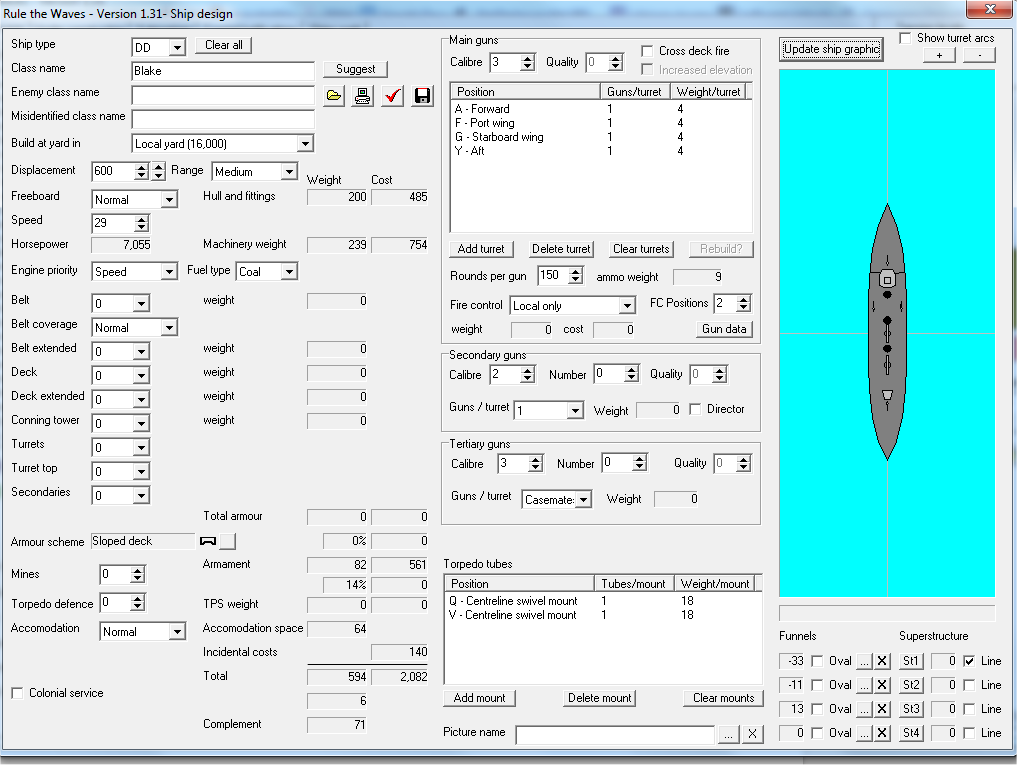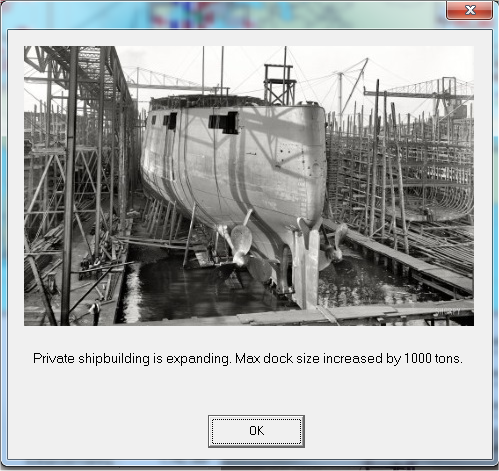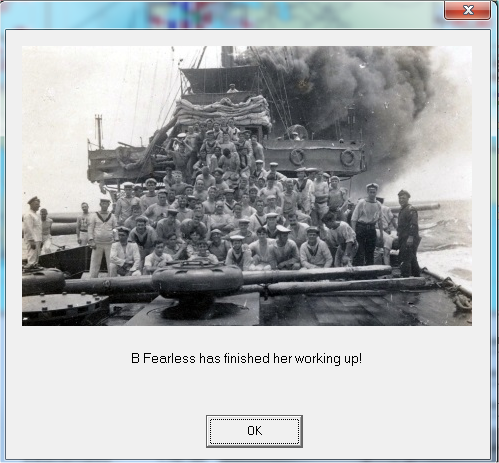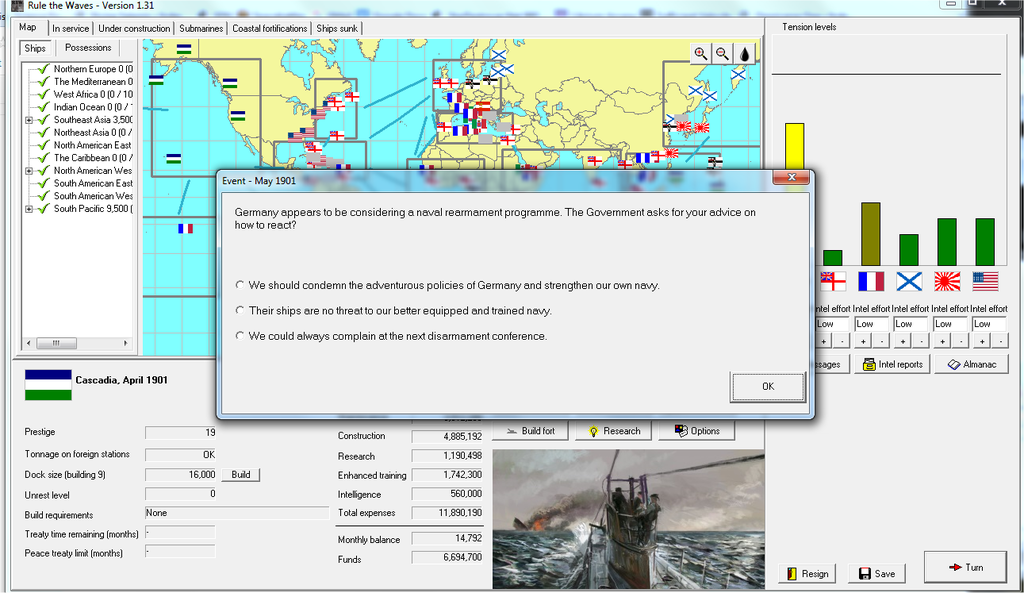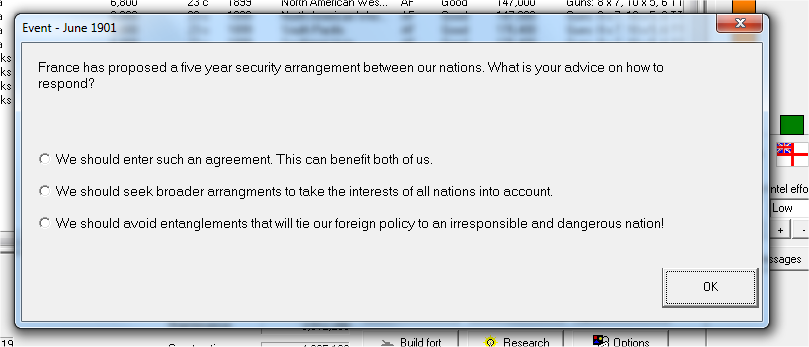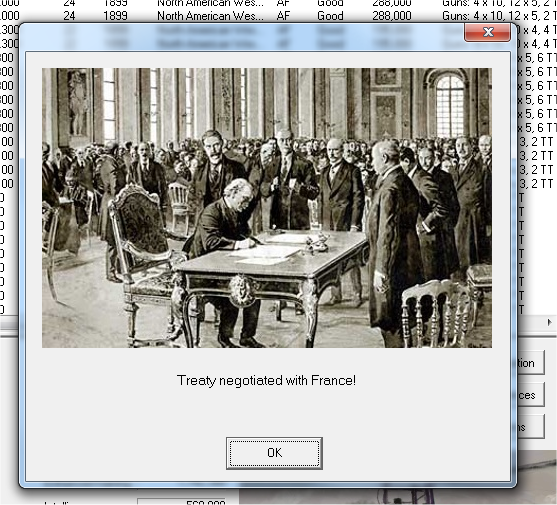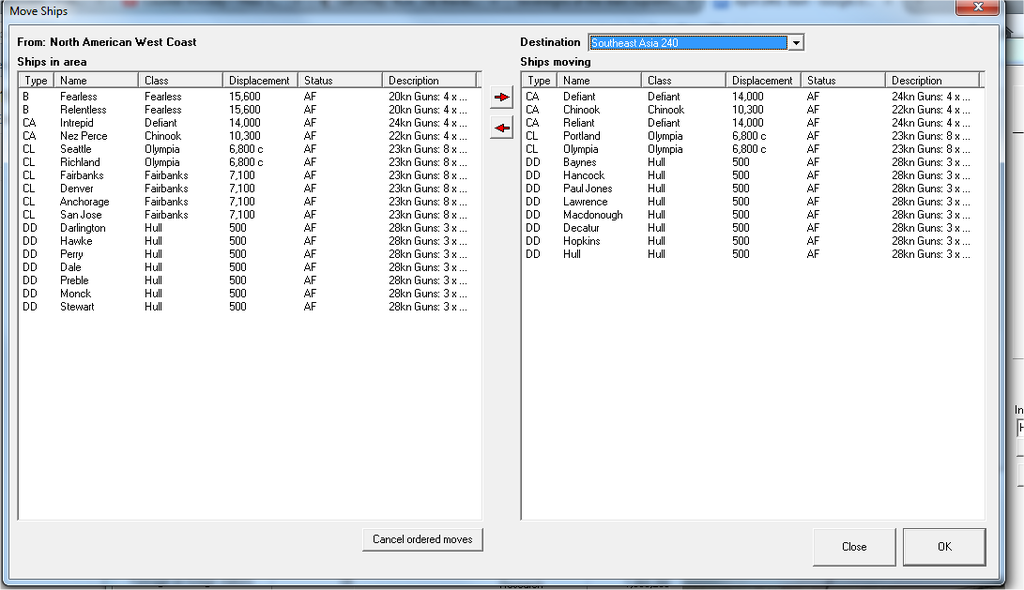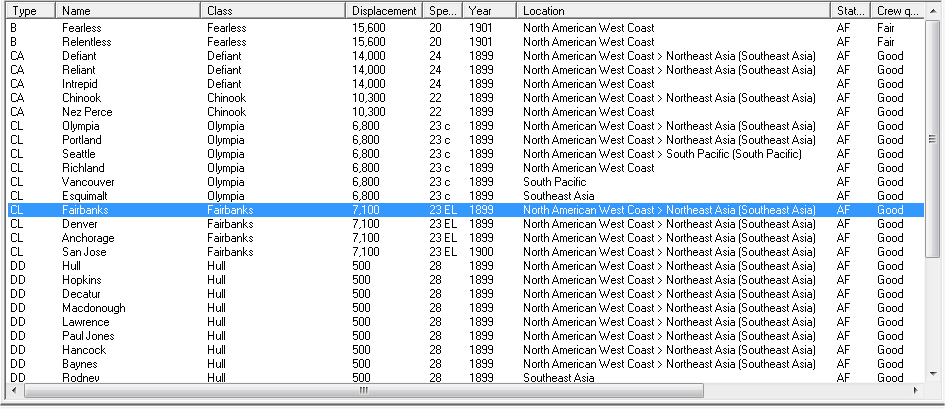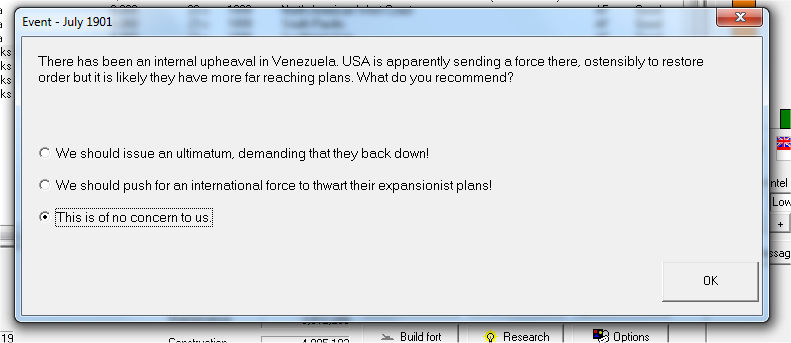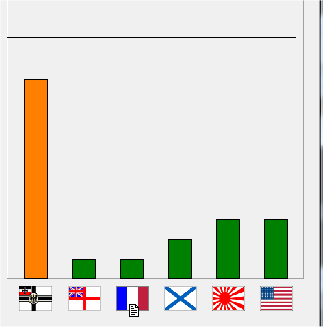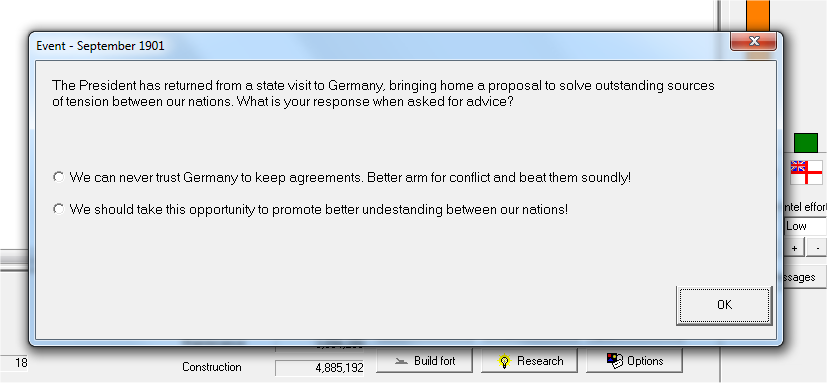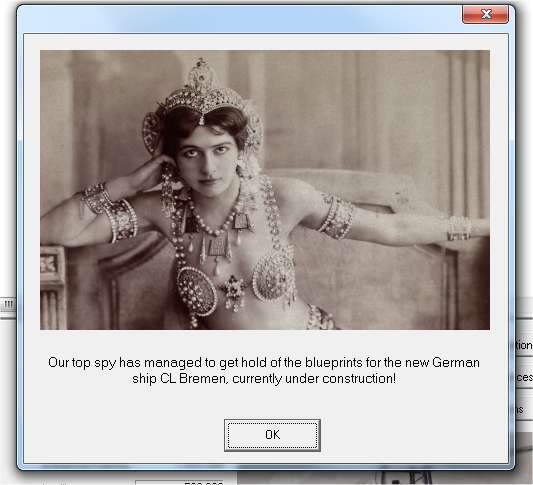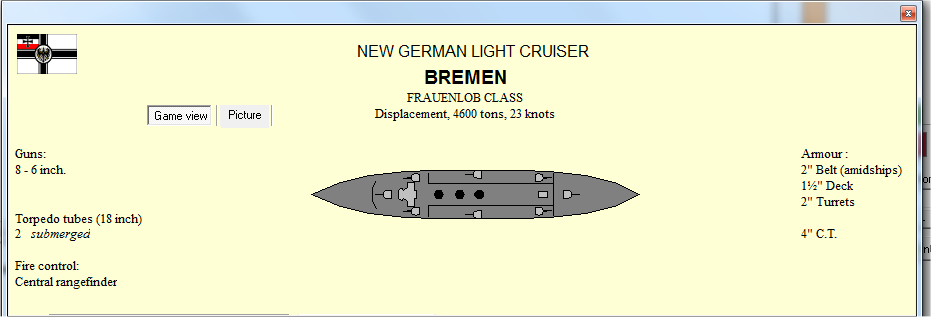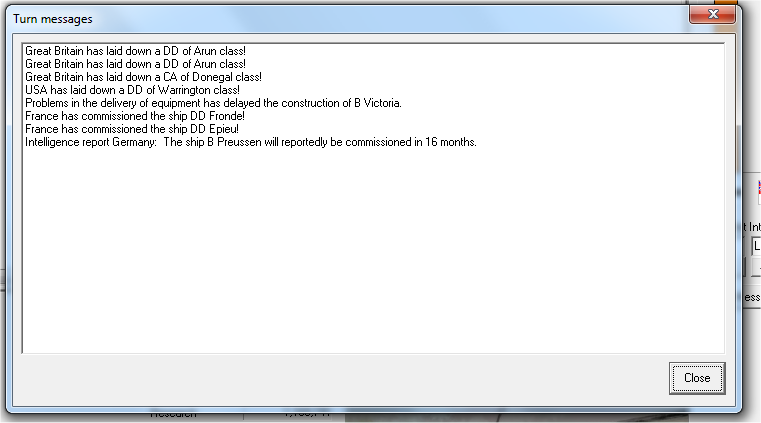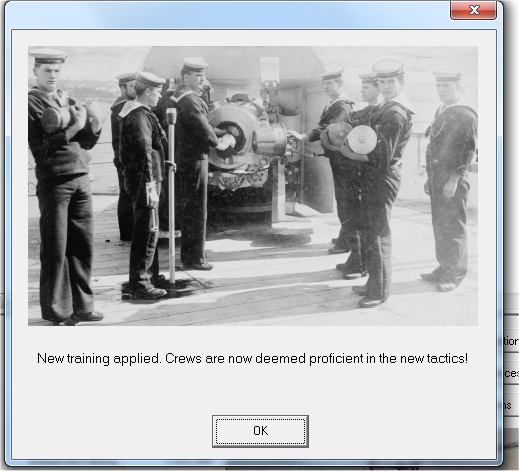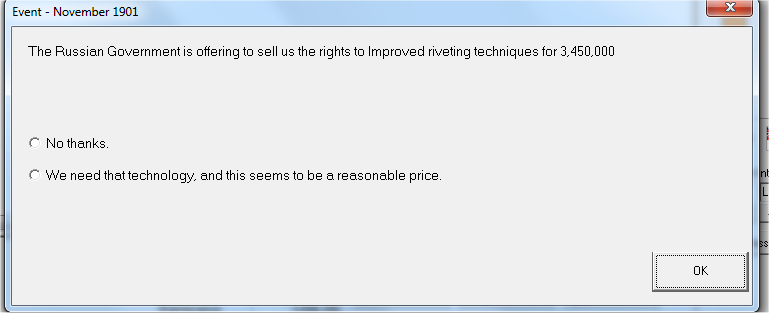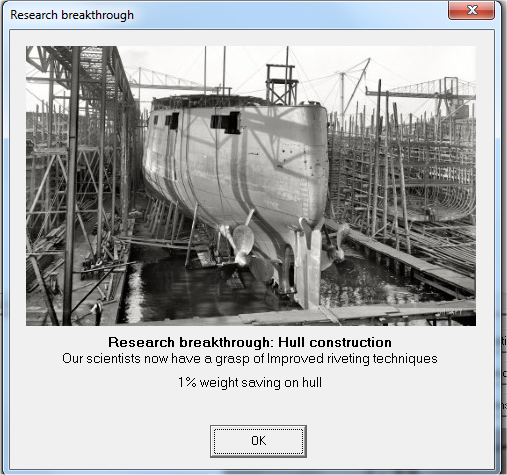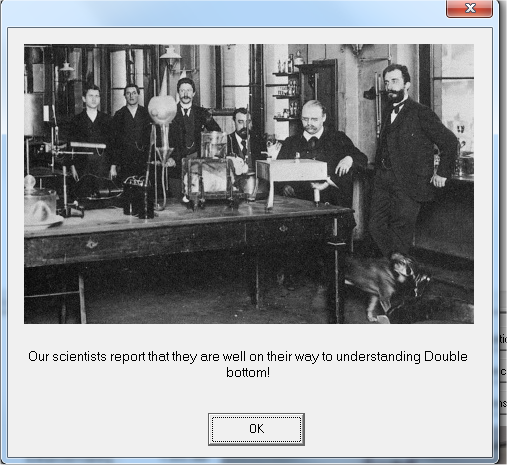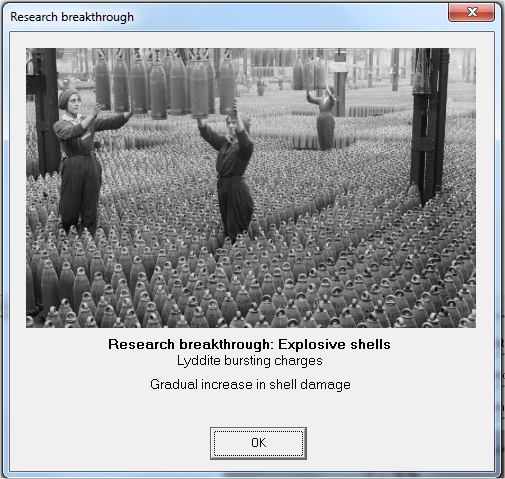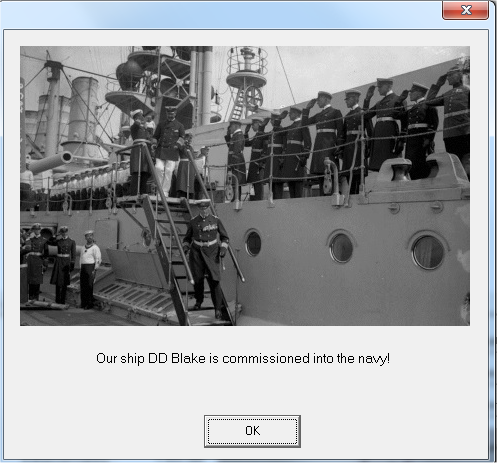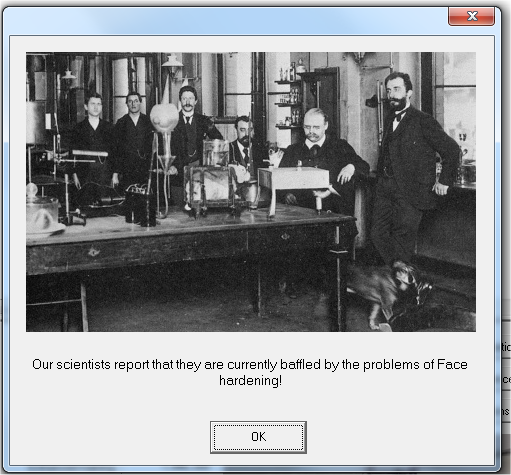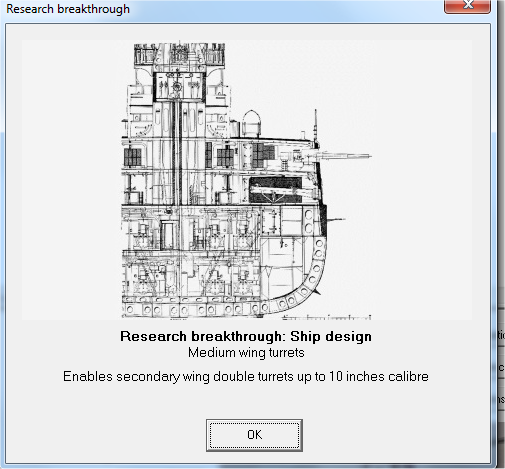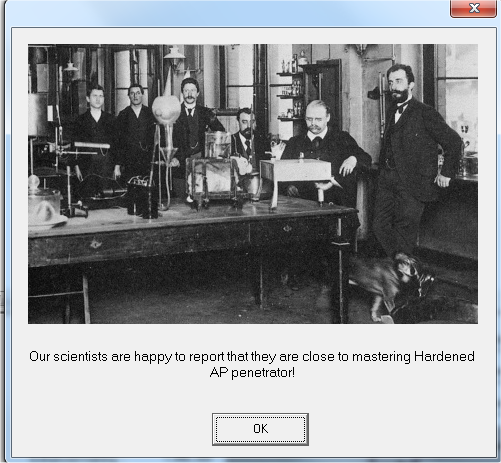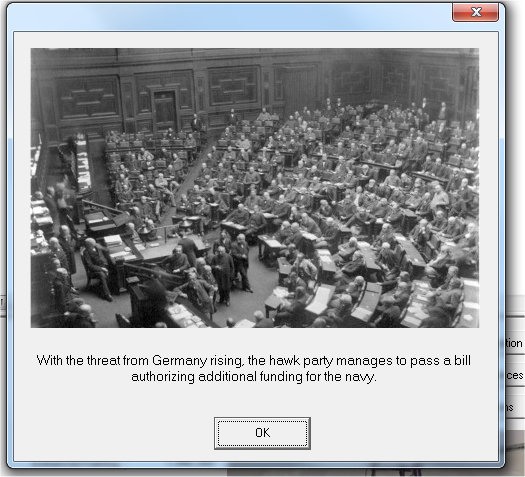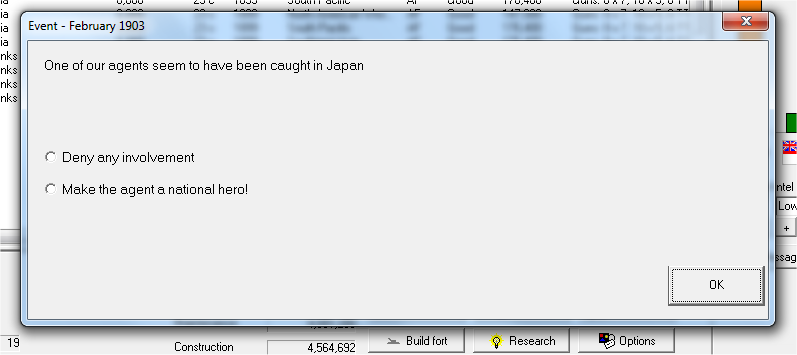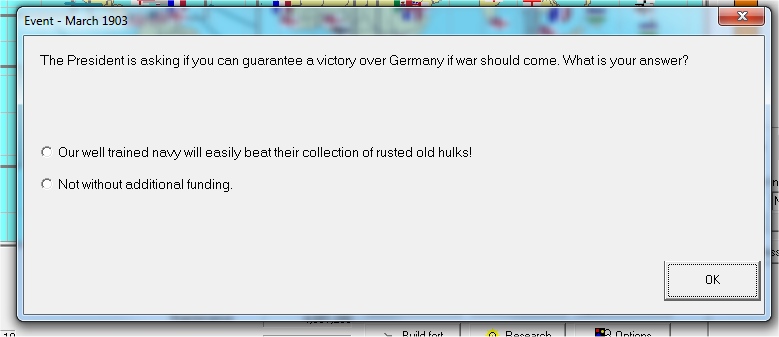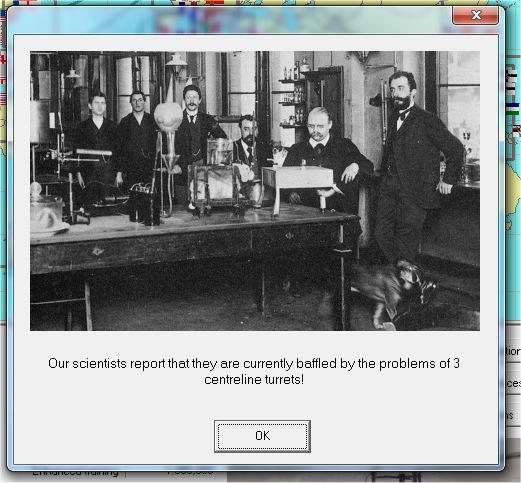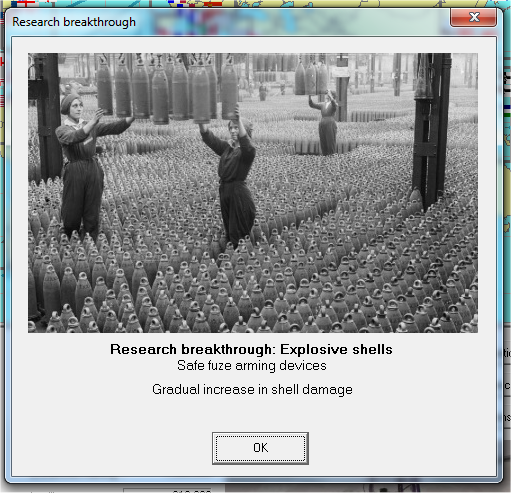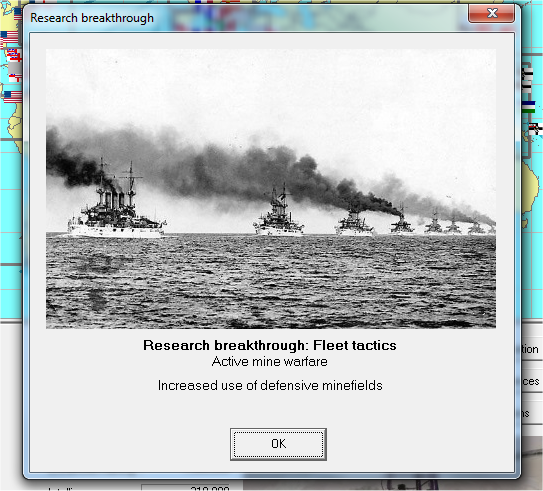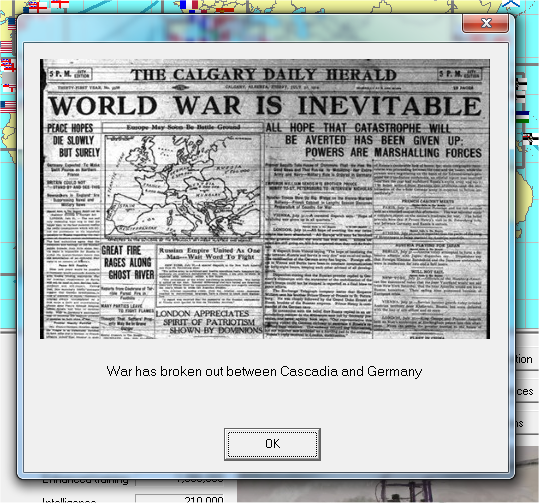January 1902
The Admiralty Building
Portland, Federal District
2 January 1902
The day after New Year's, Admiral Garrett stepped into the anteroom of his office and nodded with approval at the small gathering around him. His new staff advisor, Captain Simon Holmes, was present already, dark-haired and dark-eyed with a fine beard and mustache that he had kept properly trimmed. Captain Holmes was assigned as his scientific expert and had a particular knowledge in gunnery due to his background in physics. Yeoman Burke, who minded the office for him, was in his uniform with the petty officer rating insignia appropriately placed.
The two main figures in the office were Etps and his wife. Isabela was brown-eyed and dark-haired - with the light bronze complexion common to the Californios much like Admiral Garrett's wife Rachel - if about ten years younger than his beloved. She cut an attractive figure in her sea-green blouse and dress, with long slender arms at her sides. She and Etps looked like the proper naval couple and reminded Garrett of his family, if they had yet to produce a child between them.
"Greetings, everyone," the large man said. He took out a paper. "I have been waiting to make this announcement for some time." He smiled at the Etps couple. "Commander Reginald Etps, it is my solemn duty and my greatest pleasure to read this order. By order of the Cascadian Navy, undersigned by Admiral Wilcox the Vice-Chief of Naval Operations, Reginald Thaddeus Etps is hereby granted a meritorious promotion to the rank of Captain."
The assembled applauded, save for Reggie Etps who beamed with pride as Admiral Garrett removed the silver oak leaf rank insignia from Etps' blue-gray uniform jacket and replaced it with a silver eagle. The eagle was not quite the same as that seen on American naval Captains; the wings were stretched upward and one talon carried a naval compass while the other bore the likeness of an old muzzle-loaded naval gun.
"Congratulations, Captain Etps," Admiral Garrett said after putting the insignia on his aide. He offered his hand in congratulations.
"My thanks, sir. I will continue to do you proud," Etps pledged. He accepted his mentor's hand and shook it with firmness. Pride suffused every inch, every mere part, of his expression. Isabela planted a kiss on his cheek in congratulations.
"And now that the work day is done," Admiral Garrett stated, "I have reserved us a table at North's. My wife and the children should be arriving there by this time. The finest dining in the Federal District awaits our pleasure."
The party left for the waiting cabs to ferry them to the periphery of the government portion of the district. A celebration, to go with those already enjoyed for the New Year's, was just the thing. They had a long year ahead of them.
What the Admiral would not know is the bittersweet taste he would have for this night when he would look back upon it from a year's distance.
Cascadian naval designers and engineers report success with new six foot rangefinders to improve fire control. Additionally, teams determine how to use double bottoms to improve the survivability of Cascadian naval vessels.
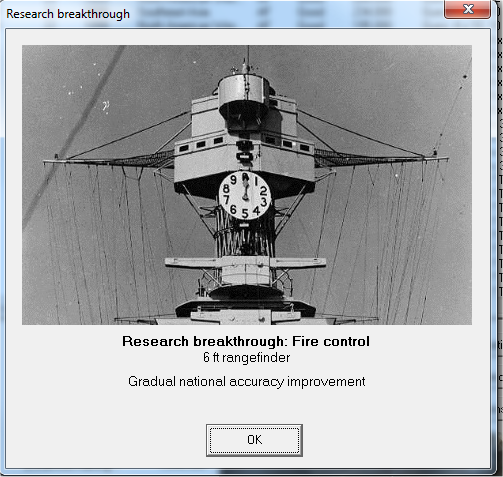
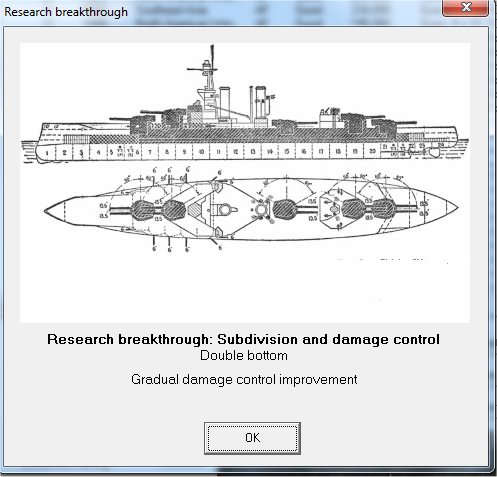
Late in the month, several German leaders call upon the German Government to issue an ultimatum to the Cascadians over Samoa. The German Government begins new defensive works on Guam and New Ireland and announces an expansion of the garrisons there and restrictions on Cascadian shipping in the vicinity of German holdings in the Pacific. German destroyers intercept and shadow Cascadian shipping moving south of Guam. The Cascadian government protests the new German stance.
February 1902
Admiral Garrett is pleased to receive further reports from his design teams and research teams on improved technology. New power rammers for gun turrets promise an increase in rates of fire. The Naval Ordinance Office reports completion of new hardened AP shields that offer superior penetration of enemy armor. And a team from San Francisco submit design schematics for an experimental coastal submarine based off of the Holland concept.
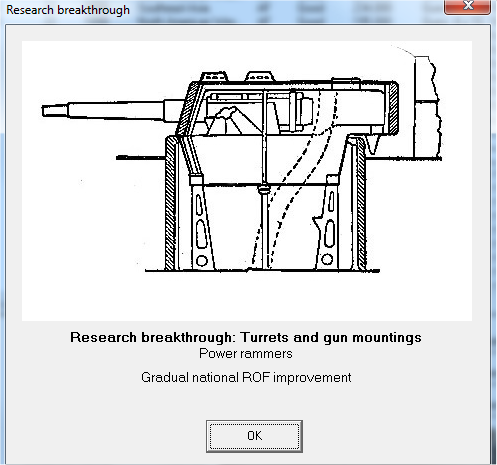
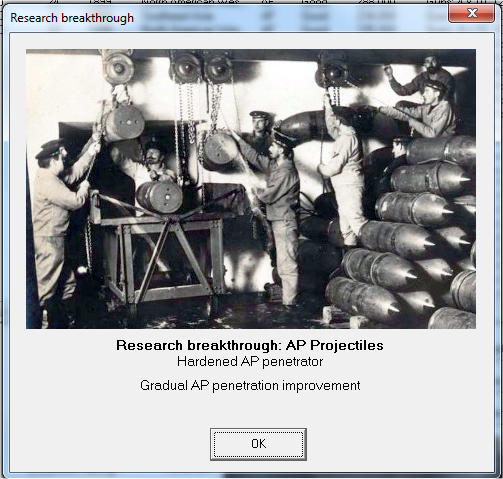
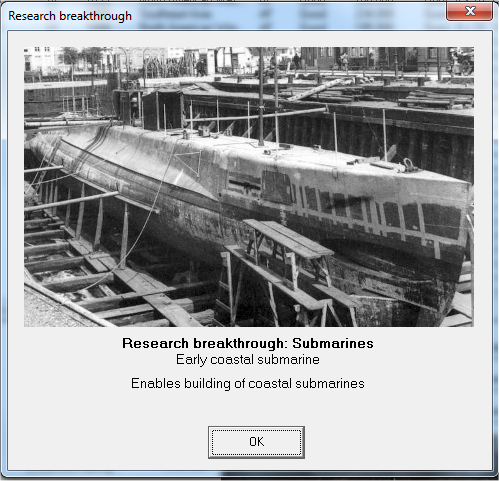
Admiral Wilburn is later informed that some of the design team's final work was made possible by the Naval Intelligence Paris Branch recovering technical schematics from France's own submarine program. The Admiral immediately orders this classified at the highest levels so as to not jeopardize the alliance.
(OOC: I have my intel efforts in France set to low… and yeah, the French probably spy on me too.)
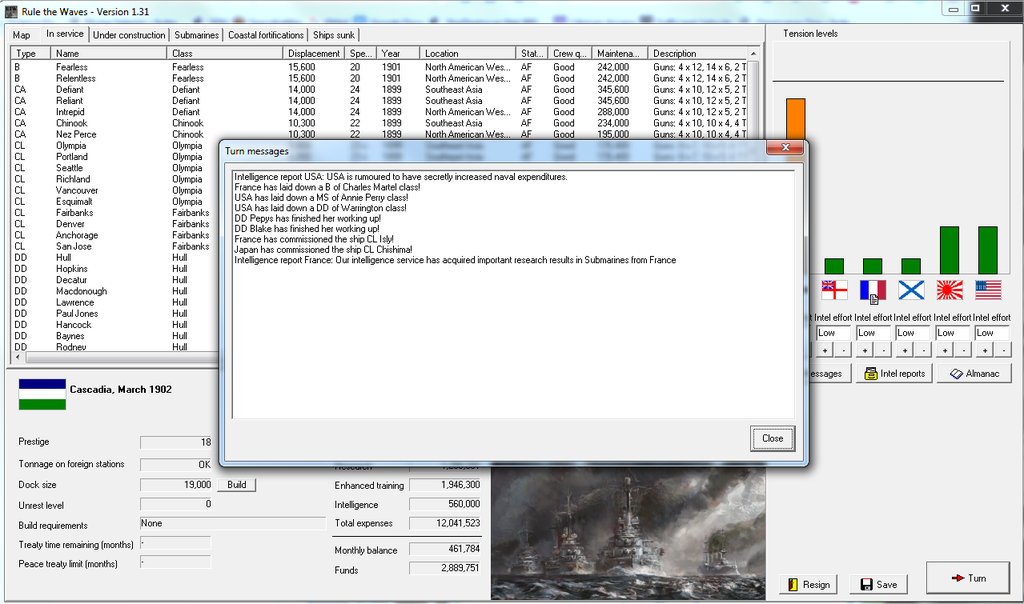 March 1902
March 1902
It is a quiet month for the Admiralty. Admiral Garrett gets a report from Captain Holmes that researchers from Reilly & Collette were reporting some successes in a new steel formula for hull construction.
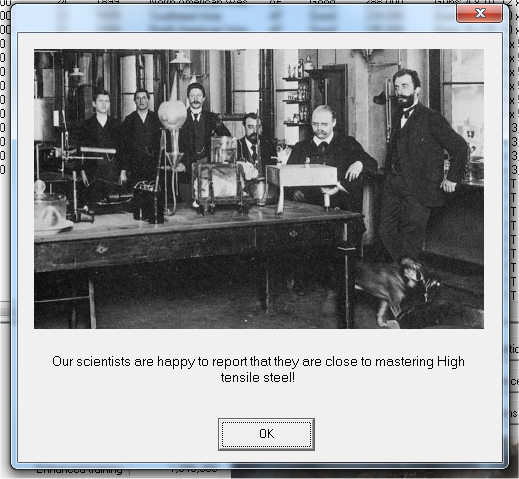 April 1902
April 1902
Careful budgeting by the Admiralty allows the Navy to fund a new series of yard slip expansions.
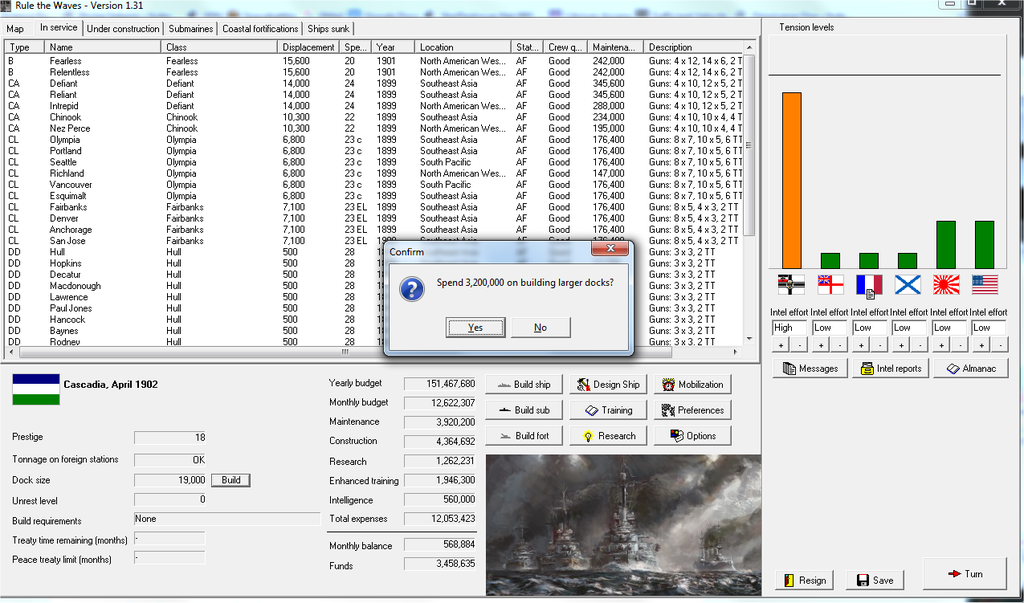
With the money for the expansions cleared, Admiral Garrett wins Wilburn's approval to order two more 1901 type destroyers of the
Blake-class: the
Rodriguez and
Bainbridge.
During the month new reports indicate that relations with the British and French governments have reached levels of amiability not seen in years. New indications from Germany indicate that the German Empire has been relaxing its stance slightly. The German military cancels plans for further reinforcements to Germany's Pacific bases.
In the Bering Sea, shots are fired by Russian and Cascadian fishing trawlers. Despite the new commercial and demarcation treaty, the shifting patterns of fish in the Bering Strait region cause a renewal of arguments between the Tsar's government and the Cascadian officials over fishing rights.
The American-Cascadian border becomes a source for trouble when Cascadian mounted police chase American bandits into the Dakotas. American cavalry intercept the Cascadian force and compel them to withdraw. Several American newspapers denounce the Cascadian police in Montana for the violation of the 108th Meridian, providing fuel for those expansionists who oppose the Treaty of Chicago's territorial dispositions.
May 1902
Queen Wilhelmina of the Netherlands calls for the world's leading naval powers to check the escalating naval race the world has undergone. Citing the clear indications of a possible war in the Pacific, which might impact the Kingdom's colonies in the East Indies, the Dutch Government supports the Queen's announcement - indeed some believe they asked her to issue it - and offers to host a disarmament conference.
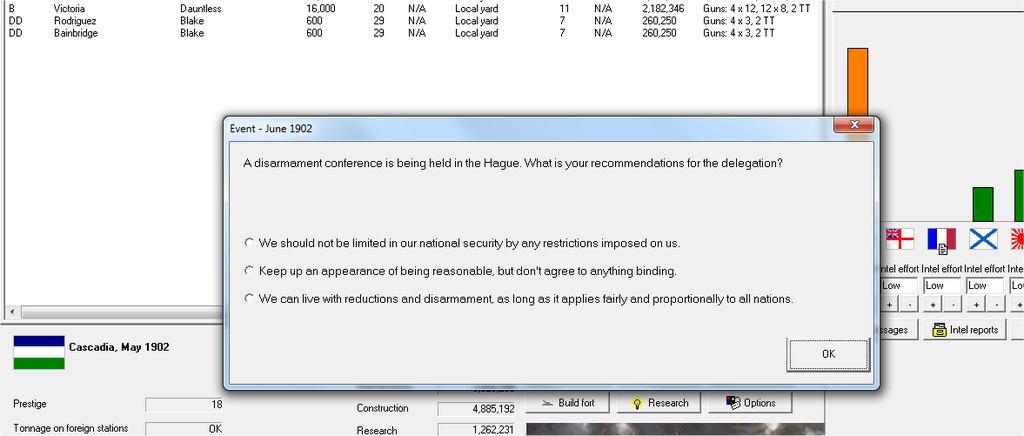
In Cascadia the proposal is met with some approval. Senator Crabbins and his Democrats urge President McGraw to completely back the Dutch negotiation. But Admiral Garrett and Admiral Wilburn publicly criticize the idea as unworkable, citing the failed Berlin conference of the prior year. Many leading Cascadian officials and politicians join in the opposition, seeing any likely treaty as being likely to diminish Cascadian freedom of action. The refusal of Cascadia to join the talks leads France and Germany to do likewise; Britain therefore also refuses to join. The Dutch disarmament conference collapses before it can formally start.
June 1902
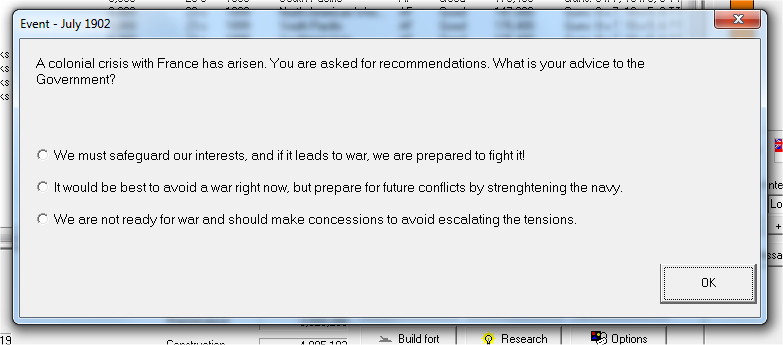
The Franco-Cascadian alliance was built on the premise that the Polynesian Question would remain quiet. But Queen Lili'uokalani, while a moderate supporter of the arrangement, refused to back down on the question of Polynesian nationhood. When an island chief in French Polynesia was accused of promoting resistance to French rule, he fled to Hawai'i under the personal protection of the Hawai'ian Queen - indeed, she had sent her yacht to pick him up days before French authorities were ready to arrest him. The French Government bitterly protested this to the Cascadian Government and demanded that the offending chief be turned over to France.
Recognizing that the issue could split them from their allies, President McGraw and Foreign Secretary Biddle sought a middle road through the crisis. They could not force the Queen of Hawai'i to relent, not without undermining Hawai'ian independence, but they needed to placate their ally. Secretary Biddle decided upon a public statement on the matter; Cascadia would not support any interference in French rule in Polynesia.
The French were not pleased the chief was not turned over, but the French Government - also desiring to sustain the alliance lest its breaking collapse the Government - was willing to accept the Cascadian statement and withdraw their demand.
July 1902
The budget increased voted on earlier in the year permitted the Cascadian Navy to order a new series of minesweepers.
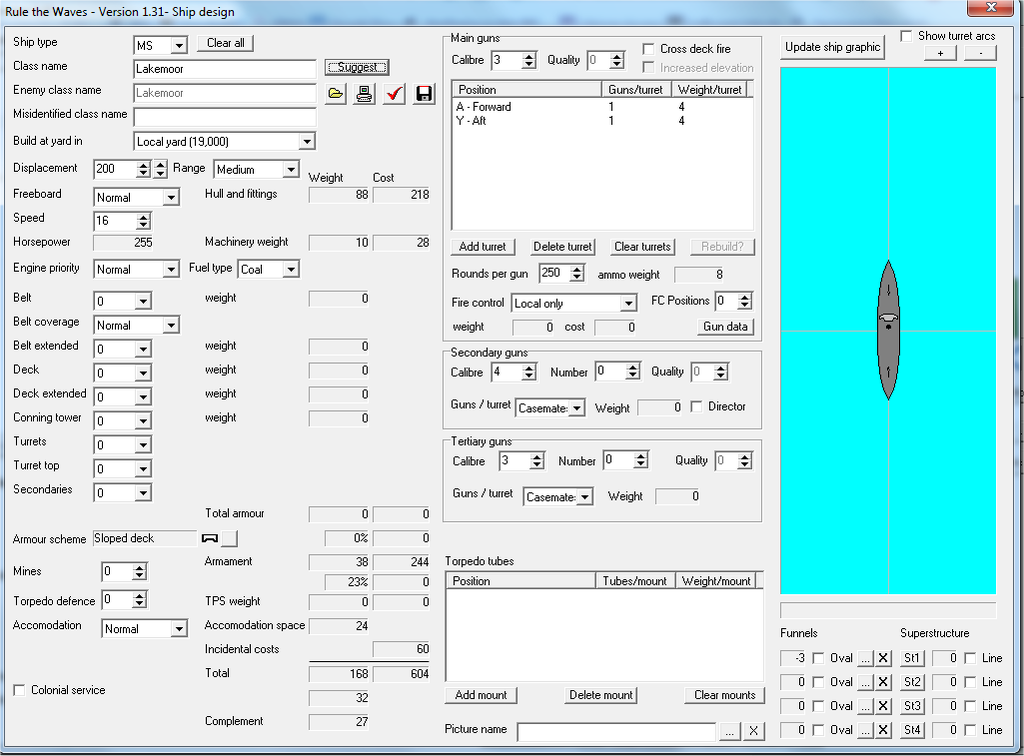
The increase in the Cascadian budget did not sit well with the Japanese Imperial Government. Cascadian power in the Pacific and the French alliance was casting a new pallor over the relations between the two Pacific naval powers.
August 1902
Admiral Garrett approved a recommendation that the plans developed earlier in the year for submarines be explored. Two coastal submersibles, the
Cuttlefish and
Salmon, were ordered to be constructed for testing purposes.

The Peruvian government placed an order with Parker & Sons for a new 600 ton destroyer type utiilziing the latest in Cascadian advancements. Vice CNO Wilcox prevailed upon the Government to order the contractor to refuse for fear that Cascadian advancements may fall into foreign hands. But Admiral Garrett considered this risk acceptable, and slight enough, and believed that the licensing rights to the new technology would benefit the Naval budget. Admiral Wilburn signed with Admiral Garrett and indicated to Secretary Semlin his support for the sale. The Cascadian government thus approved the sale.
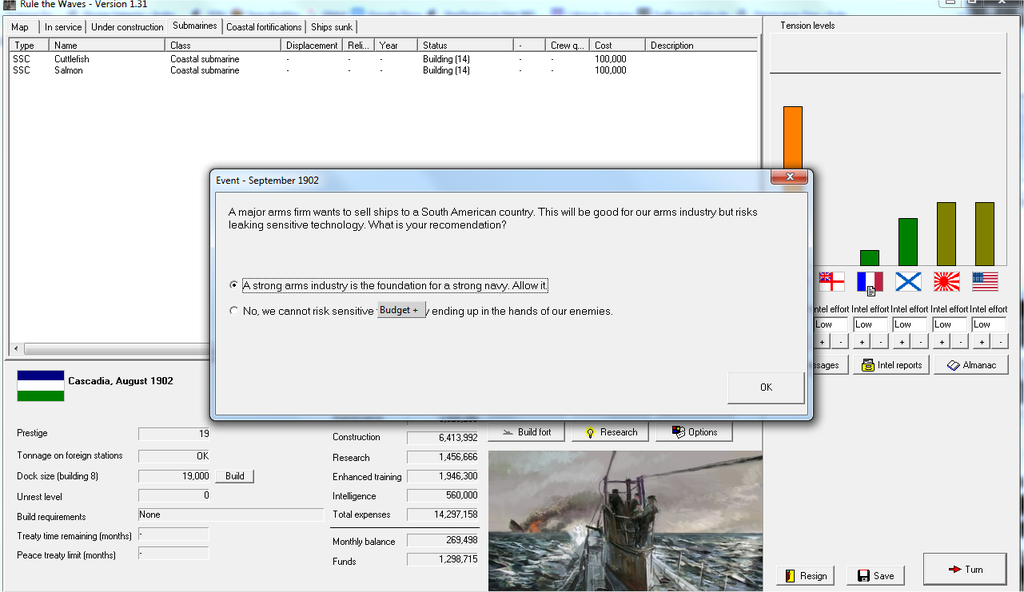
Additionally, the Engineering Office reported to Admiral Garrett that side drum machinery was now available in new construction.
 September 1902
September 1902
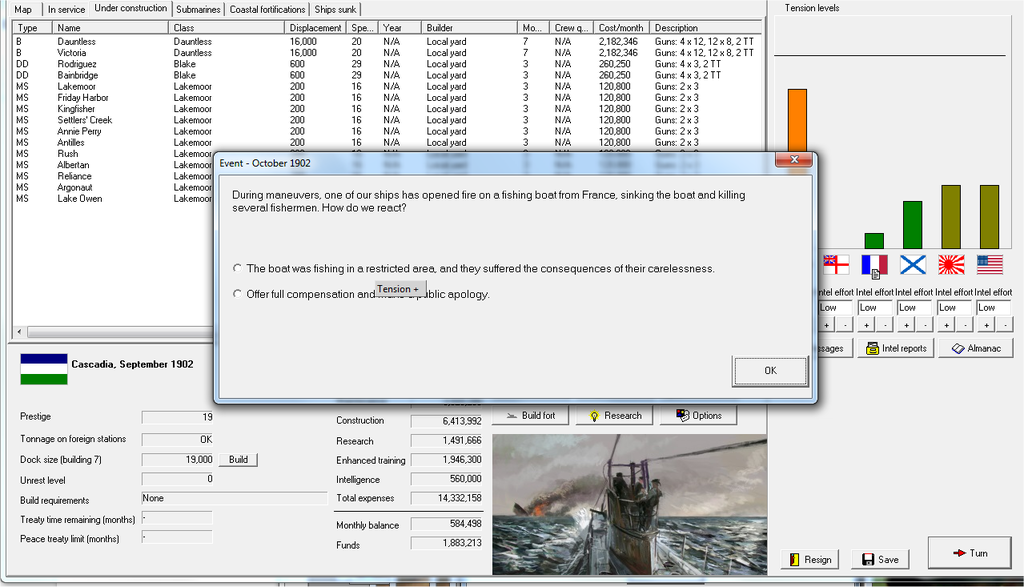
A French fishing vessel, the
Jolie Marie, drew too close to Samoa during the Samoa Squadron's monthly live fire exercises. A failure in signaling communication prevented the ship's safe departure from the firing area and a stray 5" shell fired by the
Seattle badly damaged the ship, killing several crew and injuring many more. The ship was towed to safety in Apia and the crew treated.
The French Ambassador approached Secretary Semlin on the matter. The families of the deceased were demanding compensation and the court-martialing of the
Seattle's officers. Naval Secretary Semlin, aware of the damage the incident could do to the alliance with France, approached Admiral Wilburn about compensation being paid.
Admiral Garrett and the others in the Admiralty responded negatively. "It was a tragedy, yes, but a tragedy brought on by a foolish French fisherman who failed to recognize the clear signs of a naval exercise going on," Admiral Garrett wrote to Secretary Semlin. "It is out of the question for the Cascadian Navy to assume responsibility for this error."
Despite Foreign Secretary Biddle's support for the French note, Secretary Semlin agreed with his Admirals. President McGraw and Secretary McInnes agreed to politely decline the French note. It caused some further stirring in Paris but, for the moment, did not indicate jeopardy for the French alliance.
October 1902
Despite the
Jolie Marie sinking of the prior month, the French Government proved supportive of the alliance by offering to the Cascadian Admiralty design work for a reliable pendulum mechanism to use in Cascadian torpedoes. The Cascadian Admiralty supported the purchase, though it would mean delaying completion of the destroyers and minesweepers to fit the naval budget.
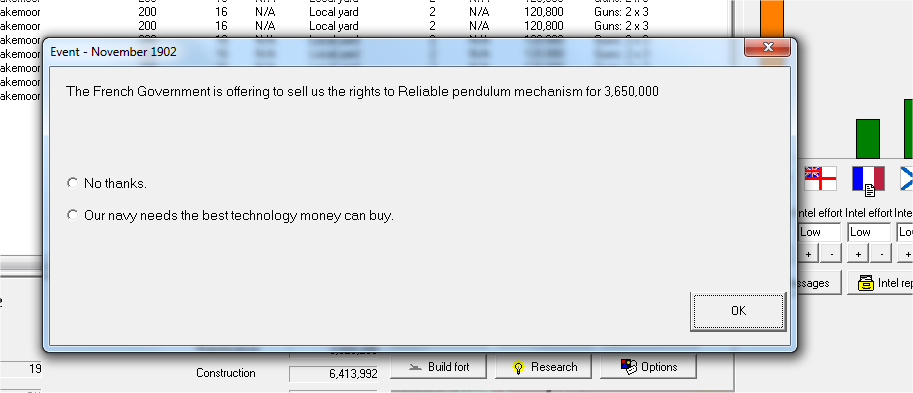
A report came to Admiral Garrett that Naval Intelligence's Security Office had indications that agents had successfully purloined torpedo schematics from the Naval Ordinance Offices. An investigation of all officers and personnel with relevant access was ordered.
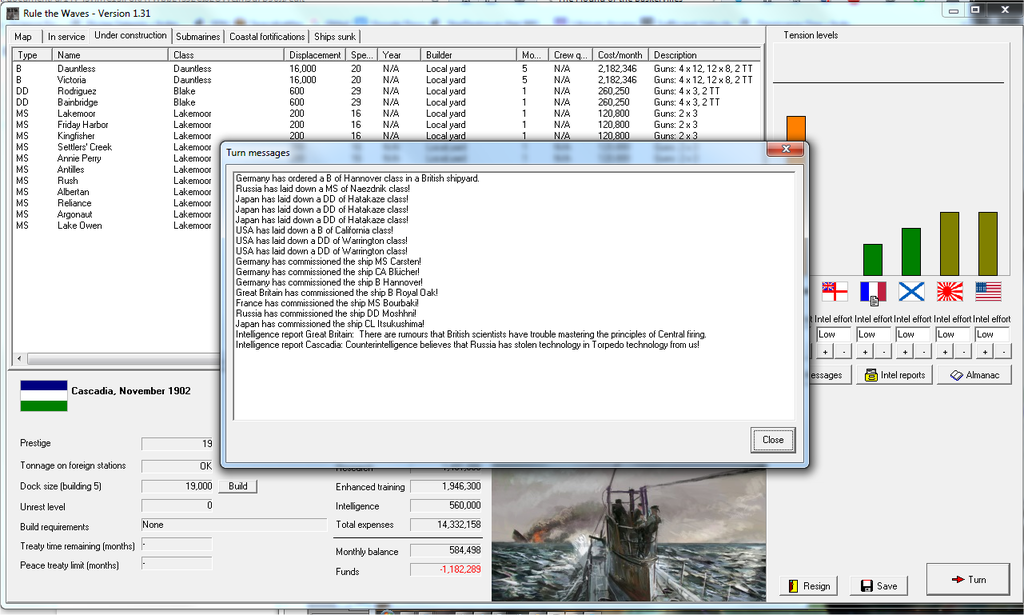 West Portland, Oregon
West Portland, Oregon
25 October 1902
Lieutenant Commander James Hawke was a patient man. He had to be in his profession.
One important element was bland clothes. One mustn't stand own, either through being too open or being too obviously private. The goal was to make a potential spotter's eyes pass over you without comment.
The Commander was also a brave man. During the war with Spain he had led the mixed landing party of Marines and sailors that stormed the Spanish earthworks at the mouth of Manila Bay. A bullet wound in his shoulder still ached when the weather turned just right. Now he showed his bravery in different ways as an officer in the employ of Naval Intelligence's Security Office.
In other words, he was a spy hunter.
The word was that the Russians had gotten a man in the Ordinance Office, or maybe even the Design and Procurement Office itself. Hawke was particularly irritated by the latter. He had respected Admiral Garrett as a bold commander; the Admiral had personally pinned the Cascadian Legion of Merit to Hawke's chest after the war. That the Admiral's office might be the source of a traitor selling his country's secrets…
Therefore Hawke had resolved his investigation to start there. To make sure there were no signs that could rebound upon the man he respected, or if there were, to ensure such treason was paid for quickly and with minimal scandal. He had thoroughly investigated the Admiral's home - surreptitiously of course - and found nothing there. The Admiral never brought his work home and never spoke of it to his family beyond vague, useless generalities. His maid, Miss Stamper, was a patriotic woman. The manservant Liu Ganlu had been cleared with a quick investigation; the Chinese immigrant was loyal to his employer and had no means to be a leak.
Now it was on to other officers. Starting with the good Captain Etps.
Hawke remembered the English-accented officer well. He had served as the Admiral's aide-de-camp during the war. A respectable staff officer who was yet to earn his own command, save a brief time as Executive Officer on the
Rodney in a tour during 1899. Married to a
Californio woman of middling means - a potential hook, yes.
Thankfully the townhouse that the Captain had leased was across from a mid-range hotel, the Burley-Cain. Hawke was renting a room for this investigation that allowed him to monitor the Commander's movements. Just briefly, just long enough to make sure he had cleared Etps sufficiently.
But there was a strange prickling feeling he was getting this Saturday night. It was 9:30PM, an hour when people were coming home from their nighttime excursions - if they were not already home to escape the growing winter rain endemic to the region at this time of year - and yet… he saw lights on at the main door. A moment later a coated figure emerged from the main door.
Hawke acted quickly. He knew the routes of the cabs that moved through here and how far they were by the sound they made upon the road. He had time. He grabbed his jacket, scarf, and hat and rushed from his rooms. He went down the nearby stairs with alacrity and made his way to the door. The nightkeeper of the hotel eyed him as he went out.
Cool rain came down upon the hat he'd put on. The street light showed that Etps was still waiting. Hawke dare not cross the road here; not when he might get spotted and spook the Captain. His heart began to pound at the prospect that laid before him. Captain Etps… an agent? A traitor? The scandal... it could destroy Admiral Garrett, indeed, it could ruin the entire Admiralty. In these tense times!
A hansom cab rolled up. Now Hawke crossed the road, as if to get to the cab himself. Etps hailed the cab first and started to ascend to it. Hawke's hearing was splendid and he could hear Etps as he called for it to deliver him to the hotel district along the river, across the Willamette from the Government Block of the Federal District.
A streak of boldness came to him. It had been years since he had seen Etps during the war. While Etps might recognize him, he would not know Hawke's current job. The Security Office had given him a cover posting in the Admiralty as a junior aide to Admiral Wilburn's office, the sort of sinecure a wounded war hero might be given until his health was considered sufficienty restored. Rather than risk that a second cab may take too long to approach the street - and knowing he had insufficient time to call for one - Hawke called the cab as well. The driver looked at him and Hawke asked for a destination that would come before the River. An area where he would be more likely to find a waiting cab and, if necessary, had at least a hope of following Etps on foot.
He settled into the cab beside Captain Etps. He gave a nod of his hat. It was kept as one might expect it to be kept in the rain. That it put a shadow over most of his face within the cab was a pleasant aid to the Commander's efforts.
Etps said nothing to him. Immediately Hawke's senses went on alert. His quarry seemed pensive. Tense. Not necessarily from fear - although he did sense Etps was discomforted by his presence - but from a sort of anticipation.
Whatever it was, it absorbed Etps' mind on the trip. Hawke's destination soon came up and he departed. Etps had barely noticed he was not alone, so absorbed he was in anticipation of whatever he was doing. Hawke looked about and was in luck; a brougham cab was waiting for a fare. Hawke hailed it down and gave the order for where he wanted to go. It was a destination that was sure to take the cabbie in the same road. An extra half-dollar was offered to promote the cabbie's speed in the matter and soon they were off. Hawke watched intently as the hansom with Etps in it soon came into sight. It remained so.
Until the last road. Hawke's own cabbie turned. Hawke started for a moment before stopping himself. He cursed inwardly. His planned destination was indeed closer along this tight road, the kind a cab would not ordinarily take… unless a cabbie had a half-dollar inducement to make good time, at least. They clattered along the shadows in a place where smart men usually avoided night time travel. Hawke absentmindedly reached for his revolver. A shooting was the last thing he wanted. To be killed by a robber, though, was even less desirable.
Thankfully this did not occur and soon they were around the corner and back to safer streets. Hawke looked out the rear window. There was some traffic of cabs in the street and they had indeed overtaken Etps' cab. Hawke recognized the chestnut mare pulling the hansom along. He watched it come to a stop in front of a building while his own cab went on. He called for his cab to stop.
"But we're still half a block from…"
Hawke gave him to promised half-dollar addition to the fare… and an extra quarter. "For your time," he said simply. The cabbie shut his mouth and said nothing more.
Hawke clambered down from the brougham and went back down the street. The cab driver of the hansom had already turned to another road. But the red brick building he had dropped Etps off at was clearly the destination; an apartment house of some sort. He read the advertisement beside the door; apartments for "working bachelors of means". The look of the place was fine, clearly not housing for working class men. He slid into the door when another man stepped out, wearing his rain cloak in such a way as to obscure his face. Clearly another man here who wanted privacy.
Hawke spotted Etps going up the stairs. Another man, with fine well-kept blond hair, was at his side. Etps' companion was in a blue smoking jacket and matching nightrobe.
They were holding hands.
"Excuse me sir."
The voice prompted Hawke to turn. A large man stepped up to him in a fine jacket. The glint of a revolver in a holster at his belt came to Hawke's eye as the figure stepped toward him. "This is a private dwelling," the man said in a clear tone. Clear, not hostile, and certainly not welcome. "Unless you are a tenant or have business with one, I must insist you leave."
"Very nice housing you have," Hawke noted. "Might I ask what it would take to become a tenant?"
The man looked him over closely. "I do not believe you would be able to live here, sir."
"I have an excellent income. The rent is unlikely to be an issue if it is under a hundred dollars a month."
"It is your look and manners. You are not suitable for a tenancy. Please leave or I will be forced to remove you."
Hawke noticed that others were looking his way. Many quickly averted their gazes when his eyes swept over them. Others kept their looks on him, as is defying him to identify them.
Oh yes. This was definitely a place he was not suited to live in.
"My apologies, sir," Hawke replied. "I will leave."
"Good. And I do not wish to see your face again. Our tenants value their privacy highly and do not suffer detectives like yourself well."
"Of course not," he said, walking out as he did. Hawke stepped back into the fall rain and drew in a sigh.
His instincts had been mostly right about this late sojourn. But not in the way he had feared.
Unfortunately, his discovery had only made the question more difficult, and delicate, for the Admiralty.
November 1902
As expected, the expense of the French torpedo research compelled the Navy to suspend construction on its new destroyers on the cusp of their completion. A minesweeper was also suspended in construction.
Later in the month, the
Argonaut was the first of the new minesweepers to be completed. On trials it was found the ship was capable of a faster speed than designed for. Which, granted, was not of much use for a minesweeper.
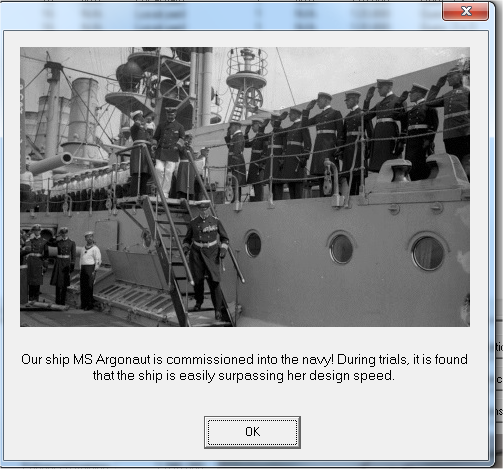
It is in retrospect that we must see the November 1902 elections as the final moment on which the future events could reasonably have been averted. The rise of the Democratic and Socialist Parties in Cascadia had long been predicted by many political observers. 1902 had thus loomed as their year. Had the two parties' planks been reconciled, the events of the following year might yet have been averted and much to the benefit of the orphans and widows of the fighting to come. - Excerpt from "The First Pacific War: A General History" by Sophie Garrett, published 1942
The November Elections changed the shape of the House. The Socialist Party won several seats from the industrial cities of the Republic and the Democrats made other gains, changing the makeup of the House to remove the Republican plurality there. New election results in the provinces also portended a change in the Senate to give the Democrats an equal number of Senate seats to the Republicans. The election result's main effect was to effectively eliminate Secretary of State McInnes' Republican-Conservative coalition government. Secretary McInnes promptly dissolved the Government. President McGraw, a Republican himself, was forced to turn to Senator Crabbins of Klamath to form a new Government.
Crabbins attempted to form a coalition with the Socialists, under Congressman Flagg of Surrey. But the Socialists' demands were too far even for Crabbins' Democrats, involving sharp military spending cuts and negotiations with Germany. Flagg believed the election results to indicate that the Cascadian populace was against the prospect of war and the Cascadian imperialism he had spent years denouncing; as such he demanded the Foreign Department and a free hand to renegotiate the Manila Treaty to effectively end Cascadian primacy over the Philippines, as well as an abrogation of the French Alliance - "Cascadian workers will not die for Imperialism". This was too much for Crabbins, who recognized that his own party would fracture and it would cost the Democratic Party their first Government in over a decade. He turned to Senator McInnes and Congressman McKiernan to form a Democrat-Republican coalition government instead, which would maintain the French alliance but fulfill Democratic promises for reforms to unemployment insurance and worker pensions. This would mandate cuts to the naval and defense budgets.
McInnes agreed to the coalition. While the Parliament would not meet until December, he won for himself the Foreign Department and ensured Semlin's retention as Naval Secretary. Thus guaranteed that the Republicans would keep control of those two vital elements of Government policy, he acquiesced to Crabbins' Democrats taking the Treasury as well as the Interior and the War Department. Crabbins was made Secretary of State.
As the new government took shape, Chancellor von Bülow made a public statement to the effect that if the Cascadian Government reduced its naval spending, Germany would recall some of the garrisons sent to the Pacific and re-open talks on German interests in Samoa. The prospect of a drawback from a war thus loomed.
But despite the arrangements, Crabbins had not accounted for the strong Republican support in the Cascadian Navy League. Admiral Garrett privately signaled concerns that the new legislation and naval cutbacks would imperil future Cascadian naval programmes. Admiral Wilburn publicly supported the Navy League's protest against the military cutbacks.
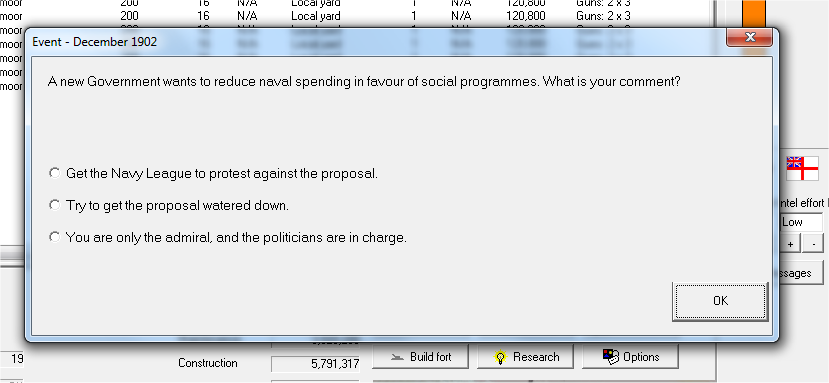
The Russian Government now lodged an official protest, accusing the Cascadian Government of ignoring the repeated violations of Russian fisheries in the Bering Sea by Cascadian fishermen. A Russian cruiser nearly collided with a Cascadian fishing trawler while paying a visit to Dutch Harbor to protest the issue.
December 1902
When Parliament met in the first week of December, the new budget bill formed by Crabbins was defeated in the House by a narrow vote; while over half of the Republicans supported it, others rejected the vote, as did the Conservatives, the handful of Representatives of the Cascadian Populist Party, and a clique of Democrats led by Rep. Alonso Muniz of New Mexico who believed that war with Germany was inevitable and that the party's plank could not sacrifice the national interest. An effort by Crabbins to employ the Whip failed and Muniz threatened to cross the aisle and sit with the Opposition, specifically the Populist Party. Crabbins' control over the Cabinet was thus immediately weakened.
The Germans responded to the bill's failure by not recalling their latest reinforcement convoy. German destroyers began to reconnoiter the Cascadian fleet base at Chuuk (Truk) Lagoon. One destroyer veered so close to the lagoon's defense perimeter that the cruiser
Reliant fired a warning shot across its bow. Cascadian cruisers later retaliated with a close pass of the German naval base at Rabaul, where the German ships sortied to intercept the cruisers and fired warning shots that nearly struck the cruiser
Fairbanks.
Meanwhile the two new
Blake-class destroyers were officially commissioned into the Navy..
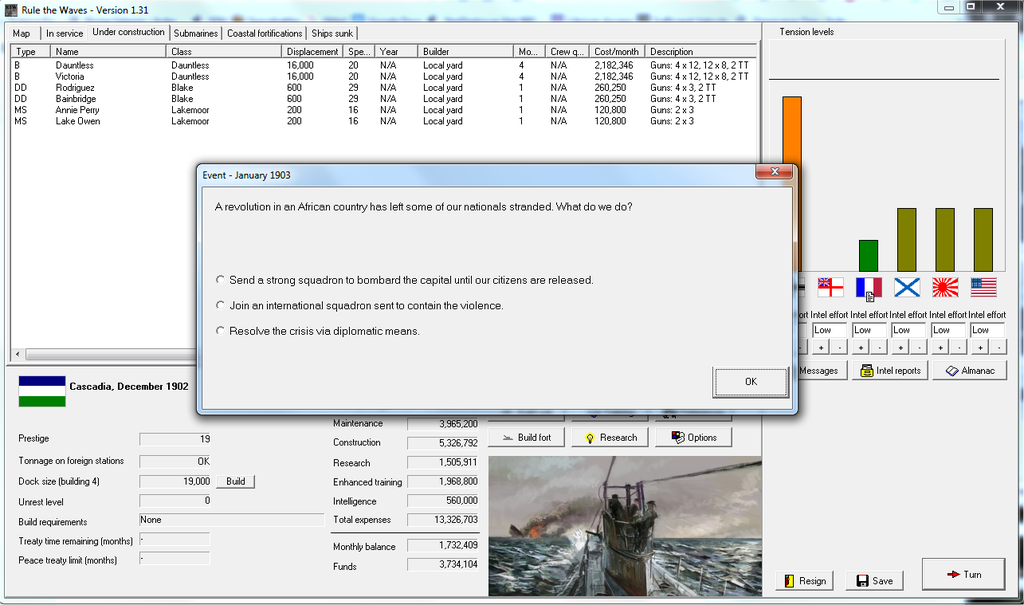
Trouble erupted in Africa later in the month. A native revolt gripped the Portuguese colony at Mozambique. Portuguese forces on hand failed to suppress the uprising in time and the rebels declared a new government. Violence by native forces expanded to attack other European interests, as well as a Cascadian commercial interest.
In light of the issue, Admiral Wilburn instructed a small force led by the
Defiant to the Indian Ocean. The Cascadian squadron rendezvoused with an Anglo-French force off of Lourenço Marques and sailed into the harbor. Royal Marines and Cascadian Marines deployed to secure the British consulate and restore order to the city. The Portuguese were able to use the intervention to regain control and push the rebels out into the countryside. The rebellion collapsed and its ringleaders fled the country, many going into German Tanganyika.
German ships attached to the German Indian Ocean Squadron arrived to joint the international force as the fighting reached its zenith. Although the Germans cooperated, the Cascadian and French ships were clearly hostile to their presence, such that the British Admiral on station was forced to take command of the force and keep the two forces separate. But this did not extend to shore leave. As New Year's approached, the pacification of the city finally allowed for shore leaves to be granted to the sailors of the squadrons.
Although efforts were made to keep the crews separate, eventually they crossed. There was only light tension at first, but when crewmen of the cruiser
Olympia accused German sailors of cheating during a card game, a brawl broke out. Shots were fired and three German sailors were killed in the exchange. Two French and four Cascadians were wounded; two of the Cascadians later died of their wounds. British forces broke up the riot and the Portuguese authorities banned all of the offending parties from further leave.
News of the debacle went out over the wires. German opinion was inflamed at the conduct of the Cascadian sailors. The German government demanded they be tried for murder. In Portland the Cascadian government accused the German crews of instigating the fight and firing the first shots, and thus refused the demand.
The British were not entirely pleased by the conduct of the Cascadian fleet either. Several admirals opined that it might be best that Britain avoid working with the Cascadian Navy until it imposed more stringent discipline on its crews.
Meanwhile, on the 27th of December, the German General Staff ordered its forces to go on standby alert. Plans were made to issue a general mobilization. The Pacific territories of the German Empire were ordered to prepare for conflict and all non-German shipping was ordered out until further notice. All leaves and furloughs in the German Navy were canceled.
On the 28th of December, the French canceled all military leaves.
On New Year's Eve, Admiral Wilburn wired the commanders of Samoa Squadron and East Asia Fleet Command. All shore leaves were canceled. The ships returning from Mozambique were ordered to refuel and put all efforts into scraping their bottoms and being ready to deploy after the New Year. The new Secretary of War, Gregory Burnell, canceled all Army leaves and ordered the Cascadian Army into war preparation.
By New Year's Day, 1903, the war that had been feared for the last two years now crested over the Cascadian nation like a tsunami, terrifying in its imminence.
But for Admiral Garrett, another matter remained to be dealt with.
The Admiralty Building
2 January 1903
The entire building was stirring with activity. War with Germany seemed imminent. The Cascadian fleets were readying to deploy. The battleships would, upon war being declared, be dispatched to East Asia, either to supplement the defenses of the Cascadian and French possessions there or to begin, if possible, invasions of the German Pacific Territories.
As Chief of Naval Design and Procurement, Admiral Garrett's job in this situation was more limited. It was to go over the naval program, to determine what construction should be pursued and how it might relate to the needs of the war. Long-term planning was harder when one needed to potentially replace losses. Even now he had a proposed design for an Armed Merchant Cruiser on his desk, to be potentially ordered when the war commenced to provide further, and more quickly employed, commerce raiding potential.
But as much as he wanted to focus on that, it was another report he had to consider. And another duty he wanted to do. And all he could do was think back a year in time and considered what it said about how fast a man could rise or fall.
The door opened. Captain Etps entered, well-kept as always. "Sir, the yeoman said you needed to see me?"
"Yes, Captain." Admiral Garrett looked over the letter before him. "Given our situation, I have been impressed by the Security Office to deal with this situation immediately."
"Sir?" Etps eyed him. The sour look upon his mentor's face made clear to him that Admiral Garrett was not going to share anything happy with him.
"You remember that issue with the Russians, Captain?"
Etps nodded. "The torpedo designs, yes. I heard the chaps in the Security Office found that some clerk in the Ordinance Offices had laid his hands on them for money. Fellow had a bit of a gambling problem."
"Yes." Admiral Garrett considered the letters in his hands. Etps couldn't read them. "Of course, you must know that discoverying the perfidy of Yeoman Bates did not come without a thorough investigation of these offices, yes?"
"I would imagine not. I myself was interviewed two months ago by a fellow from Admiral Wilburn's office. I remembered him from the war. Commander Hawke."
"Yes. Commander Hawke was helping Security Office with its duties." In truth Garrett knew otherwise. He was one of the few privy to Hawke's real job, and that had only come about due to this… issue. "You are clear of this obviously, Captain. But investigations like this… they tend to lead to things. Innocent things. Not so innocent, I suppose."
And that was when Etps
knew. Admiral Garrett watched his student's face blanch. He paled so greatly it was as if the blood simply rushed from his head.
"I may not be Mister Holmes, Captain, but it is hard to not notice the look you have just had," Admiral Garrett observed sadly.
"It is a private matter, sir," Etps insisted. "Completely private. I am not a traitor and you know it."
"Yes. We all do." Admiral Garrett put his hands together. "However, men with such secrets… they may be turned to treason in these cases. As you well know. Captain… if a man from the Security Office could follow you to that… set of domiciles, shall we say, what makes you think a German agent cannot?"
Etps remained silent. He looked like he could barely breathe. "Sir… I assure you, it is discreet. Very. And I would never betray the nation. I would never betray you."
"I believe you. But Admiral Dougherty and his men in the Security Office, they are more cynical. They know you enough, they know your family enough, to know how potent a weapon your interactions with these gentlemen…"
"
Gentleman," Etps corrected. He could barely speak as he was. But he was unable to let that remark pass. "I am faithful to him and he to me."
"...I stand corrected," the Admiral stated. "But we both know the result if news of your gentleman friend was to become public."
"My mother would die of the humiliation," Etps said. "And my father… my family… even you would be humiliated, sir. I know what people would think of my habits."
"Indeed. And the risk is there, Captain." Admiral Garrett put his hands on the desk. "I myself hold my moral judgement. I did not know this inclination lived within you. Perhaps I should have suspected, given the clear difficulty you and Isabela have shown in having children. I can only imagine what she feels if she knows…"
"She does. She knew from the beginning."
Admiral Garrett nodded. He put two and two together. "A marriage based on a mutually beneficial arrangement, then?"
"I will not break her confidence."
"You needn't. Again, I am not Mister Holmes in the flesh, but it's not a hard deduction. Now, I myself would not judge you harshly on this, Captain Etps… Reg. But you must understand the point of view of the Security Office. You would be easily blackmailed. You are, indeed, a prize catch for a foreign agent. Once caught in a net you could be compelled to share all sorts of vital information. The Security Office will not stand for that risk, Reggie. They want you gone."
Etps swallowed. "Sir. Sir, if you simply remove me, my family will be curious. They will ask questions…"
"I know."
"If it comes…" He stopped. Admiral Garrett couldn't hide his sympathy for the poor man. Whatever his private morals, he had smelled battle smoke with Reginald Etps. They had faced Spanish shells and Pacific typhoons together. Reggie had played with his children with all the charm of a good father. Indeed, "Uncle Reggie" was beloved of his little ones, especially his little girl. "I… I will not bring disgrace to my family and to your office, Admiral. I request to be dismissed so that I can do what I must to avoid…"
There was something dangerous in that pale face. In the expression of Captain Etps. Admiral Garrett jumped to his feet and rounded the desk to interpose himself between his protege and the door. "Reggie, if I let you out the door right now, we both know I won't see you alive again."
"I must spare you and the others the disgrace, sir," he insisted. Tears started to appear in his sky blue eyes.
"Do you not realize what an investigation into such an event would inevitably turn up? You would cause everything to come out."
"I have prepared for this possibility. Isabela has the necessary letters and testimony. They will prove that I hid my stress from the work, that I was on the verge of a break. It will be explained."
"Damn you, Reggie. What will my children say to that? Think of the people you'll hurt!"
"Sir, you would bring disgrace to…" Etps broke down weeping at that point. He lost all strength and nearly fell, until the Admiral grabbed him and guided him into a chair. A glass of fine brandy was placed before him.
"There, there, drink up Reg. Steady yourself. It is a shock to be outed, I imagine. I almost cannot fathom it, honestly, but I did enough to be afraid you would respond this way. But I'll be damned if I let you take your own life over this."
The Admiral waited patiently while Etps regained his composure. The drink helped to steady his nerves - just enough to do so, no more being poured. "I have dreaded this day for years, Admiral," Etps confessed. "I have always been careful. But I never imagined I would be followed. They're right, though. If I were to remain here, I would be a risk. I can't bear the thought of bringing you disgrace."
"I know. Which is why I have made arrangements, Reg." Admiral Garrett picked another form off of his desk. "Captain Cartwright of the
Anchorage came down with severe appendicitis last month. Indeed, his life nearly ended from it, and he faces months of recovery before he is fit for duty. With the war looming we need a man with experience commanding that cruiser. She will be needed to intercept German shipping in the Indian Ocean before long and to work with the French fleet and naval bases in Djibouti and Madagascar. Your French has always been superb, better than mine."
Etps looked at him intently. "You… wish to give me the command?"
"Yes, Reggie. I do. You're a brave man and have all the makings of a good captain. The nation will have need of such men before the month is out, mark my words."
"Where is the ship?"
"She put in to Bremerton before New Year's. Just a quick rotation, she's due to depart on the fifth for the Indian Ocean. You'll have little time to get accustomed to her, I'm sorry to say, but you've seen her type before."
"The Executive Officer…"
"Commander Parker never saw combat in the war, Reggie. He's a smart man, one of our rising stars, but he needs a commander who has seen combat. You'll do fine."
For several moments Etps remained quiet. He had felt like he was in darkness, with no hope of a way out, but now his mentor had lit the way to safety. At the same time, he knew what else this meant. "I'll… not be coming home, will I? I mean, even if my ship makes it through the war."
The Admiral's stern look said it all. No. He wouldn't be coming back home, not as an officer. He could win battle honors, promotion, he could rise to being an Admiral, but that report in the Security Office would always be there awaiting any effort to summon him home. Any shore posting that might threaten to see his proclivities yet come out, to enable a foreign agent to discover what he was, would be denied him. He would be living out in in the Pacific, among the islands of the Cascadian Pacific Empire (presuming it survived the war, at least), stationed in Apia or Manila or the Chuuk Lagoon or anywhere else. He would only come home when he handed in his commission and retired from the Navy.
"I understand, Admiral," he said. "I understand the chance you are offering me. I will do you and the nation proud, sir."
"I know, Reggie. I know you will." He clapped a hand to the man's shoulder. "Best to get ready, then. You'll need to be on the Puget Line in the morning. Give my regards to Isabela."
"I'll make sure she knows, sir. I'll make sure she knows what you've done for me, even now. Please, my best to Rachel and the children."
The Admiral accepted Etps' hand for a handshake. It wasn't necessarily their last - indeed, he would try to see Etps off in the morning, if his schedule permitted - but it felt like it. He was sending his young friend off to war, where glory and death awaited him. It was entirely possible that he had saved Reggie from his revolver's bullet just to doom him to the depths of the ocean or the terrible end that could come from a German shell.
But it was the best he could do for the man. The only thing he could do that had met the approval of the Security Office. Captain Etps could still serve the Cascadian Republic he was sworn to, despite whatever private issues he might have, by defending it upon the oceans that were her lifeblood.
All the Admiral could do now was pray that his friend survived the war that was soon to come.

